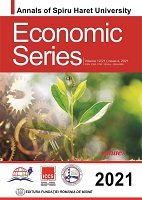LEADERSHIP AND GOVERNANCE ISSUES IN NIGERIA AS A CONSTRAINT TO SUSTAINABLE DEVELOPMENT: A REFLECTION OF THE ‘END SARS’ PROTEST
LEADERSHIP AND GOVERNANCE ISSUES IN NIGERIA AS A CONSTRAINT TO SUSTAINABLE DEVELOPMENT: A REFLECTION OF THE ‘END SARS’ PROTEST
Author(s): Samuel Chuks Ugoh, Wilfred Isioma UkpereSubject(s): Politics, Governance, Economic policy, Economic development, Socio-Economic Research
Published by: Editura Fundaţiei România de Mâine
Keywords: change; development; poverty; inequality; public policy;
Summary/Abstract: Most of the African states have joined the roll-call of the hundreds of ‘failed states’ engrossed in the inter-ethnic wars, genocide and adverse and disruptive regime changes, and Nigeria is not an exception. In fact, the country has become seedbeds of violence, terrorism, mass migration of criminals across the borders, refugees’ movements, etc. These factors have weakened the state as well as force it out of its public policy role towards socio economic and political development. Two decades since democracy was reintroduced in the country, Nigerians have not really witness true changes to their socio- economic well-being as expected. Broadly speaking, they are currently demanding for another kind democracy with a redeeming quality. The country’s poor leadership has been identified as a major factor to these crises and conflicts. Perhaps, it could be the major reason for the recent End Special Anti-Robbery Squad (SARS) protest in the country. This paper therefore examines how leaders emerged in Nigeria and the policy formulation in terms of development. The work also traces the reasons for ethno-religious crises, nepotism and corruption by these leaders.
Journal: Annals of Spiru Haret University. Economic Series
- Issue Year: 21/2021
- Issue No: 3
- Page Range: 59-69
- Page Count: 11
- Language: English

